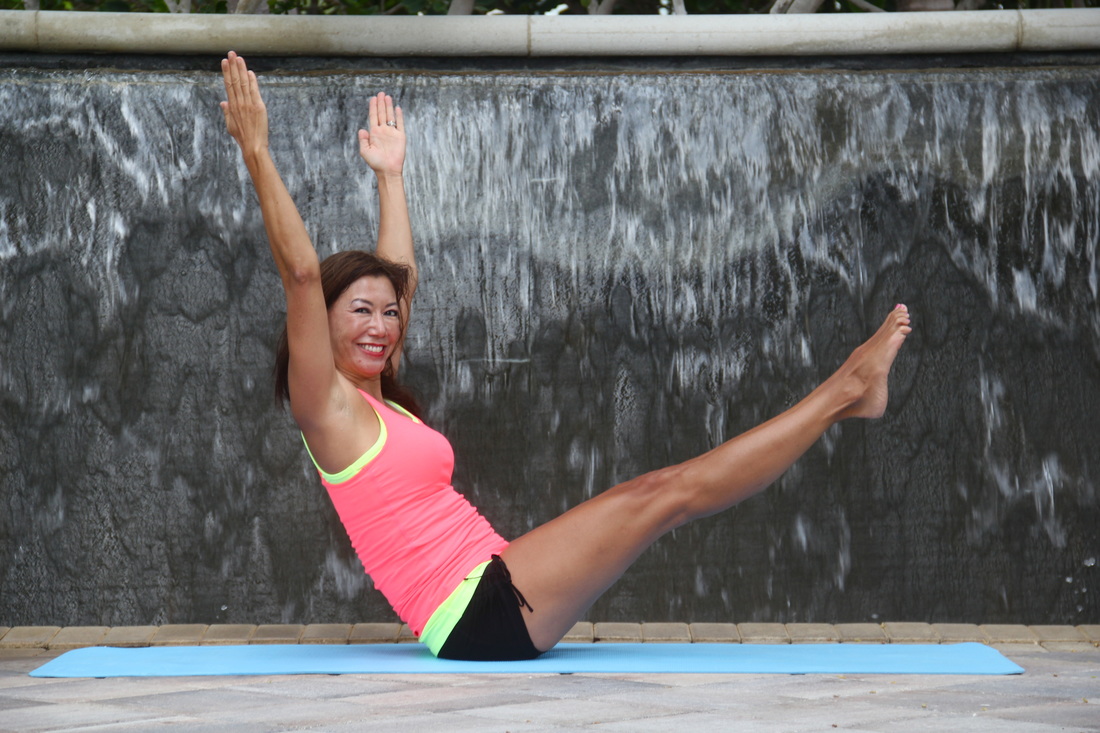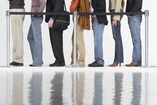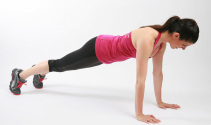 Shirley shows light weight, easy-to-pack fitness equipment.
Shirley shows light weight, easy-to-pack fitness equipment. For those of you who missed our live interview, Shirley Archer, JD, MA is a certified personal trainer, yoga, Pilates and meditation teacher as well as best selling author. Shirley lives in Los Angeles and Switzerland so she is a true road warrior with real life experience with long hauls and heavy travel.
WTJ: How did you go from Wall Street attorney to wellness expert?
I’ve always been a Type A person, still am today, and began my career as an attorney working for a large Wall Street law firm. I worked long, demanding hours and did not have time to consider alternatives. I became sick with the flu, bronchitis, walking pneumonia. I developed coughing asthma and could not talk. I needed to leave my job to attend to my health. After over one year of being sick, my doctor told me that I had “Chronic Fatigue Syndrome” and that he was not sure that I would ever feel better. My immune system was exhausted. It was at that moment, I realized that I had been passively waiting for the doctor to “fix” me. I was waiting for a magic pill. Then, I got it. My health is my responsibility and only I can create it. So, I began to study everything that I could to restore my own health. With exercise, meditation and mindful practices, good nutrition, counseling and dedication, I became fit and healthy again. And, I decided that I was an intelligent and educated person, but this had happened to me. I had an information gap. And, I dedicated myself to educating others about how to optimize their health and happiness. And, here I am today, 15 books later and as passionate as ever to help others.
WTJ: What are your tips for long hauls, traversing time zones and acclimating to time changes?
START ADJUSTING BEFORE YOU GO. You can jumpstart your body’s adjustment., if you’re going to have a significant time change. Science tells us that the body can adjust about 1 hour per day (that is what we used to be able to travel without high technology). Therefore, start waking up 1 hour earlier each day for a few days before your trip. If that’s too much, do it in 30-minute increments and go to sleep earlier.
WTJ: What tips do you have for recovering after arrival from a long trip?
EXTRA Hydration and LIGHT EXPOSURE really helps – The day before the trip, I set a phone alarm reminding me to drink a liter of water first thing in the morning, around noon, and mid-afternoon to make sure I’m well hydrated. Make an effort to expose yourself to sunlight as soon as possible after you arrive. If it’s still light, take a brief walk outside. If it’s too late, do it first thing the following morning. Exposure to natural light stimulates our own body clock and speeds our adjustment. Look up the fitness facilities at your hotel – even splurge on a personal trainer appointment your first day in to orient you, so you can fit in a training session. Alternatively, schedule a MASSAGE at the spa. It’s a great way to relieve the aches and pains after a long flight. Best to book these in advance, so you can do it right when you arrive.
WTJ Packing light is always a good idea but what light weight fitness equipment do you recommend packing?
If you have a regular training routine, I recommend three light fitness tools — an exercise tube or band for toning, a jump rope for cardio and warm-up and a stretching strap for flexibility. You can even bring a lightweight yoga travel mat – also “sticky” socks and gloves can even replace your mat, if you know yoga postures.
WTJ: What strategies do your recommend for healthier and more comfortable air travel?
Bring a sleeping mask and ear plugs and/or wear noise cancellation head phones. Planes are very loud. Drink lots of water. If water gets boring, lots of airlines also offer quick soups. Drink those instead or tea. Bring your own tea bags so that you can have decaf or herbal blends. Aim for one bottle per hour. Trips to the restroom are good opportunities to stretch. While waiting to use the restroom, take the time to stretch, no one will mind. Standing calf stretches, as well as hip flexor (yoga dancer pose) if you can do it, are great. While seated, also try to stretch each hour. You can do a seated spinal twist, knee hug stretches one at a time, cat and cow for lower back, shoulder squeezes and rolls – all great tension relievers that will also boost circulation. Also, do ankle rolls and flex and point your feet as you sit in your chair. This will stimulate circulation in your feet and ankles and help reduce swelling.
WTJ: Often I see passengers struggle to get their luggage in and out of the overhead bins. What tips do you have to avoid sprains & strains?
Firstly, don’t overpack! Keep it light with essentials only. Make sure it’s a weight that you can lift comfortably. Avoid twisting and lifting at the same time. In a narrow aisle, face your bag and pick it up. Then turn and face your bin to lift overhead. If you need assistance, do not be afraid to ask.
WTJ: Sitting for long periods of time is unhealthy. What can passengers do while seated to relieve tired and fatigued muscles?
Yes, we all know intuitively that sitting too long is not healthy. And, now we have a growing body of research to prove it. A large scale Australian study of over 12,000 people showed that INDEPENDENT of how often you exercise, sitting for longer than 3 hours at a time increases your risk of heart disease, diabetes and premature death. Another review of studies that included over a quarter of a million people shows similar results. Researchers believe this is due to the lack of circulation. Movement creates health for the human body. So, we’ve got to move it, move it, like the song suggests :)
WTJ: What advice do you have for those that want to get out to exercise?
Identify and use legitimate running and walking routes – Every city has great running and walking routes, from urban parks to desert paths and a resource American Heart Association’s walking paths.
Before you go out, make sure you tell someone where you plan to go and when you plan to return. If you don’t tell a travel partner, alert the front desk at the hotel. Make sure you take the hotel address and phone number with you. Check with the concierge and let him or her know your fitness level and what distance you’d like to run or walk. Also, Chronicle Books has a number of “City Walks” e-books for major cities worldwide. It’s a super resource.
For those that missed the live video interview, Shirley gave us some great examples of stretching exercises you can do while seated on an airplane, at your office, or at the airport. Below is an excerpt from her book, "Fitness 9 to 5: Easy Exercises for the Working Week".










 RSS Feed
RSS Feed